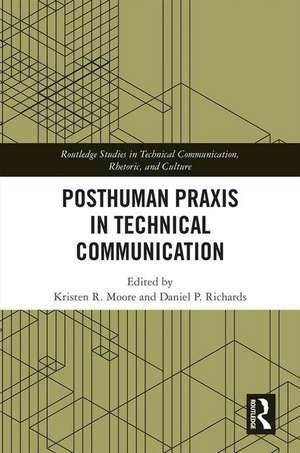Posthuman Praxis in Technical Communication: Routledge Studies in Technical Communication, Rhetoric, and Culture
Editat de Kristen R. Moore, Daniel P. Richardsen Limba Engleză Hardback – 6 feb 2018
| Toate formatele și edițiile | Preț | Express |
|---|---|---|
| Paperback (1) | 426.23 lei 6-8 săpt. | |
| Taylor & Francis – 17 dec 2019 | 426.23 lei 6-8 săpt. | |
| Hardback (1) | 822.34 lei 6-8 săpt. | |
| Taylor & Francis – 6 feb 2018 | 822.34 lei 6-8 săpt. |
Preț: 822.34 lei
Preț vechi: 1104.23 lei
-26% Nou
Puncte Express: 1234
Preț estimativ în valută:
157.40€ • 171.03$ • 132.31£
157.40€ • 171.03$ • 132.31£
Carte tipărită la comandă
Livrare economică 21 aprilie-05 mai
Preluare comenzi: 021 569.72.76
Specificații
ISBN-13: 9780815384854
ISBN-10: 0815384858
Pagini: 310
Ilustrații: 66
Dimensiuni: 152 x 229 x 25 mm
Greutate: 0.59 kg
Ediția:1
Editura: Taylor & Francis
Colecția Routledge
Seria Routledge Studies in Technical Communication, Rhetoric, and Culture
Locul publicării:Oxford, United Kingdom
ISBN-10: 0815384858
Pagini: 310
Ilustrații: 66
Dimensiuni: 152 x 229 x 25 mm
Greutate: 0.59 kg
Ediția:1
Editura: Taylor & Francis
Colecția Routledge
Seria Routledge Studies in Technical Communication, Rhetoric, and Culture
Locul publicării:Oxford, United Kingdom
Public țintă
Postgraduate and UndergraduateCuprins
Foreword
(Carl G. Herndl)
Introduction
(Kristen R. Moore and Daniel P. Richards)
Part I: Shifting Politics and Histories
1. Storytelling as a Balancing Practice in the Study of Posthuman Praxis
(Emily Legg & Patricia Sullivan)
2. Secret/Agent
(Julie Staggers and Michele Simmons)
3. Other-Oriented Rhetoric as Posthuman Witnessing of Wangari Maathai’s Arboreal Networks
(Andrew Mara)
4. Factors to Actors: Implications of Posthumanism for Social Justice Work
(Emma J. Rose and Rebecca Walton)
Part II: Shifting Methodologies
5. Can Objects be Moral Agents? Posthuman Praxis in Public Transportation
(Meredith A. Johnson and Nathan R. Johnson)
6. Writing Down the Machine: Enacting Latourian Ethnography to Trace How a Supercomputer Circulates the Halls of Washington, DC as a Report
(Sarah Read)
7. Nonhuman Agency and Constitutive Intertwining in Military Accident Reports
(Victoria Sadler
8. User Experience in a Networked Environment: How Latour Can Help Us Do Better UX Work
(Guiseppe Getto, Nathan A. Franklin, Sheryl M. Ruszkiewicz, and Jack T. Labriola
Part III: Shifting Workspaces
9. The Role of Metis in Revising Automotive Recall Letters
(Ehren Helmut Pflugfelder)
10. Objects of O2: A Posthuman Analysis of Differentiated Language Use in a Cross-Disciplinary Research Partnership
Mark A. Hannah)
11. Beyond Hearts and Minds: Posthumanism, Kairos, and Technical Communication in US Army Field Manual 3-24, Counterinsurgency
(Jason Barrett-Fox and Geoffrey Clegg)
12. Investigating the Workplaces of Science
(Deborah C. Andrews)
(Carl G. Herndl)
Introduction
(Kristen R. Moore and Daniel P. Richards)
Part I: Shifting Politics and Histories
1. Storytelling as a Balancing Practice in the Study of Posthuman Praxis
(Emily Legg & Patricia Sullivan)
2. Secret/Agent
(Julie Staggers and Michele Simmons)
3. Other-Oriented Rhetoric as Posthuman Witnessing of Wangari Maathai’s Arboreal Networks
(Andrew Mara)
4. Factors to Actors: Implications of Posthumanism for Social Justice Work
(Emma J. Rose and Rebecca Walton)
Part II: Shifting Methodologies
5. Can Objects be Moral Agents? Posthuman Praxis in Public Transportation
(Meredith A. Johnson and Nathan R. Johnson)
6. Writing Down the Machine: Enacting Latourian Ethnography to Trace How a Supercomputer Circulates the Halls of Washington, DC as a Report
(Sarah Read)
7. Nonhuman Agency and Constitutive Intertwining in Military Accident Reports
(Victoria Sadler
8. User Experience in a Networked Environment: How Latour Can Help Us Do Better UX Work
(Guiseppe Getto, Nathan A. Franklin, Sheryl M. Ruszkiewicz, and Jack T. Labriola
Part III: Shifting Workspaces
9. The Role of Metis in Revising Automotive Recall Letters
(Ehren Helmut Pflugfelder)
10. Objects of O2: A Posthuman Analysis of Differentiated Language Use in a Cross-Disciplinary Research Partnership
Mark A. Hannah)
11. Beyond Hearts and Minds: Posthumanism, Kairos, and Technical Communication in US Army Field Manual 3-24, Counterinsurgency
(Jason Barrett-Fox and Geoffrey Clegg)
12. Investigating the Workplaces of Science
(Deborah C. Andrews)
Notă biografică
Kristen R. Moore is Assistant Professor of Technical Communication and Rhetoric and Director of Undergraduate Studies at Texas Tech University, USA. Her research interests include institutional rhetoric and change, technical communication, public participation and engagement, and critical methodologies. Her scholarship has been published in the Journal of Technical Writing and Communication, Technical Communication Quarterly, Journal of Business and Technical Communication, IEEE Transactions on Professional Communication, and a variety of edited collections.
Daniel P. Richards is Assistant Professor of Technical and Professional Writing at Old Dominion University, USA. His research interests include risk communication, writing pedagogy, and American pragmatism. He has published in Composition Forum, Intercom, Communication Design Quarterly, Technical Communication Quarterly, and has chapters in several edited collections.
Daniel P. Richards is Assistant Professor of Technical and Professional Writing at Old Dominion University, USA. His research interests include risk communication, writing pedagogy, and American pragmatism. He has published in Composition Forum, Intercom, Communication Design Quarterly, Technical Communication Quarterly, and has chapters in several edited collections.
Recenzii
"Moore and Richards’ collection ably brings together theories of posthumanism and praxis, offering readers ways to understand—in practical, clear language, case studies, and pedagogical examples—how the field’s turn to granting agency to non-human things impacts not just our ways of understanding the world but our ways of being in the world as teachers and scholars." —Stephanie Vie, University of Central Florida
Descriere
This collection, aimed at scholars, teachers, and practitioners in technical communication, focuses on the praxis-based connections between technical communication and theoretical movements that have emerged in the past several decades, namely new materialism and posthumanism.











